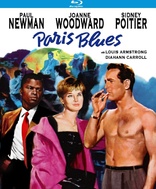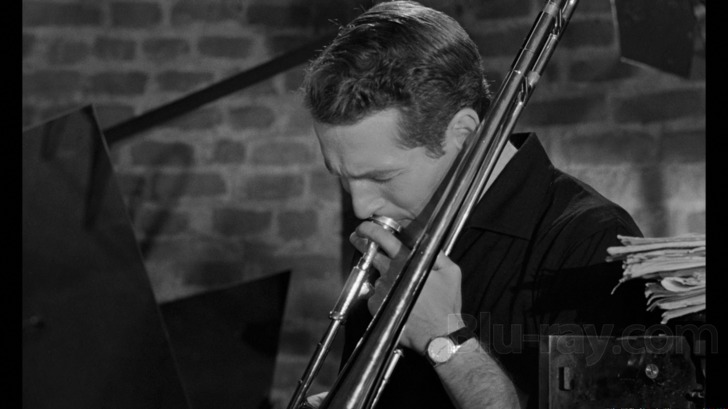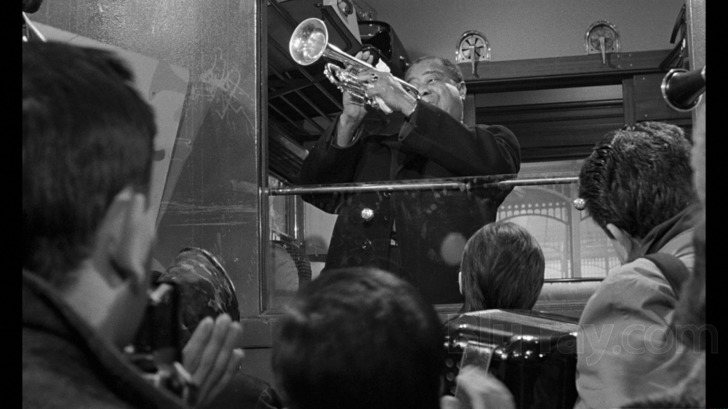Paris Blues Blu-ray Movie
HomeParis Blues Blu-ray Movie 
Kino Lorber | 1961 | 98 min | Unrated | Jul 29, 2014
Movie rating
6.8 | / 10 |
Blu-ray rating
| Users | 0.0 | |
| Reviewer | 3.5 | |
| Overall | 3.5 |
Overview
Paris Blues (1961)
Two expatriate jazz musicians, one white and the other black, are living in Paris where racism is a non-issue. When they meet and fall in love with two young girls who are vacationing in France, they must decide whether to move back to America or stay in Paris.
Starring: Paul Newman, Joanne Woodward, Sidney Poitier, Louis Armstrong, Diahann CarrollDirector: Martin Ritt
| Drama | Uncertain |
| Romance | Uncertain |
| Music | Uncertain |
Specifications
Video
Video codec: MPEG-4 AVC
Video resolution: 1080p
Aspect ratio: 1.67:1
Original aspect ratio: 1.85:1
Audio
English: DTS-HD Master Audio 2.0
Subtitles
English
Discs
25GB Blu-ray Disc
Single disc (1 BD)
Playback
Region A (B, C untested)
Review
Rating summary
| Movie | 3.5 | |
| Video | 3.5 | |
| Audio | 4.0 | |
| Extras | 0.5 | |
| Overall | 3.5 |
Paris Blues Blu-ray Movie Review
All that jazz.
Reviewed by Jeffrey Kauffman July 28, 2014There’s something just the slightest bit funny, or at least ironic, about Hollywood—a town not known for its improvisatory skills—trying to make films about that most freewheeling of American art forms, jazz. Several iconic films have arisen through the years that have sought to portray the trials, tribulations and, yes, even occasional triumphs of guys gigging in smoky nightclubs, but even the best of them often has just the whiff of artificiality and old school la-la land glamour. There are many salient examples of Hollywood attempting to at least slightly whitewash the often hardscrabble lives of jazz musicians, with films like 1950’s Young Man With a Horn spending quite a bit of its time in admittedly squalid conditions, only to deliver a perfectly implausible (and historically inaccurate) happy ending to its fictionalized version of the life of Bix Beiderbecke. While a film like The Man With the Golden Arm has jazz as subtext (including subliminally, courtesy of Elmer Bernstein’s groundbreaking score), it was probably one of the first “big” films to try to evince a more convincing jazz-like ethos in its depiction of a drug addict with dreams of grabbing the brass ring in a big band (Frank Sinatra’s character had evidently never seen the paychecks—such as they were—that most big band players took home for their work).

Director Martin Ritt was not one to shy away from his liberal tendencies in any number of his films, to the point that some of his outings like The Great White Hope, Sounder, Conrack and even the fondly remembered Norma Rae were sometimes faulted for having screed-like elements. One of the most interesting things about Paris Blues is how it very quietly, almost unobtrusively, deals with a hot button issue like racism, but that very discursive quality may in fact be why the film has never been considered in the top tier of Ritt’s output. Paris Blues flirts with a progressive ambience without ever fully embracing it (as many of Ritt’s later films unabashedly did), and as such it seems caught in a kind of time warp between those aforementioned less than authentic feeling fifties’ outings about jazz and the more aggressive ambience that would become the hallmark of later sixties films (including Ritt’s own).
Ram Bowen (Paul Newman) is an expat trombone player and composer who is scraping together a living working the smoky jazz clubs of Paris. Ram is helped by his collaborator and orchestrator Eddie Cook (Sidney Poitier), in an element of the film that will probably not mean much to non-musicians, but which actually rings surprisingly true (just do a little research on the interesting history between this film’s composer, Duke Ellington, and Ellington’s underappreciated orchestrator Billy Strayhorn—it’s Strayhorn’s great classic “Take the A Train” that starts the film). These two might seem like slackers, especially Ram, who’s a bit of a gigolo, but Ram does have a plan to get his music before a bigger audience. A superstar named Wild Man Moore (an ebullient Louis Armstrong) is visiting the City of Lights, and Ram is hell bent on getting one of his scores to the jazz legend.
Ram is a moody brute, one who dismisses not just Eddie but also his kind of girlfriend, Marie (Barbara Laage). It’s only because he’s just so dedicated, though, and an Artist (capital A, of course) of Ram’s talent and drive must be tolerated. Ram can be momentarily charming, however, as becomes evident when he goes to the train station to hobnob with Wild Man Moore. There, he spies a nervous American woman named Connie Lampson (Diahann Carroll) who is having a bit of problem attempting to communicate with a porter in French. Ram steps in and helps, and Connie confesses that her friend had taken off after another porter. When Ram asks her if her friend is as pretty as she is, Connie immediately states that her friend is “a white girl”, to which Ram responds, “All you white girls look alike.” It’s a startling reformulation of a typically racist comment, and it immediately points out what Paris Blues attempts to do in its small scale way.
Connie’s friend turns out to be a lovely if somewhat more worldly young woman named Lillian Corning (Joanne Woodward), and though the romantic angle here starts rather provocatively with Ram inviting the girls to come hear him at the club, and then assuming it’s Connie he’s “bagged” when the two do show up later that evening (ironically against Connie’s better judgment). Perhaps the morés of the times dictated the film’s ultimate retreat into relative traditionalism, with Ram and Lillian pairing while Eddie couples with Connie, but it’s still a rather forward thinking gambit, albeit one that only lasts for a moment.
There are a number of roiling subplots wending their way through Paris Blues, but what’s perhaps most interesting here is the film’s frankly fanciful presentation of jazz culture and how the French of this era lionized players in this idiom. The club where Ram and Eddie play is always full of cheering fans, and a couple of the cutaways Ritt employs to rapt audience members are almost funny at times. There’s a none too subtle emphasis on the singlemindedness required of an Artist who wants to really succeed in his chosen medium, something that lends a certain bittersweet air to the burgeoning romance between Ram and Lillian. While the two romances are the chief focus of the film, there's also a subplot involving drug use by one of Ram's sidemen that will probably remind some viewers of other filmic fare dealing with the seedier side of the music business.
While the film has a bit of a hodgepodge quality which may be the result of having evidently been written by committee (though chief screenwriter Walter Bernstein's left leaning ambience would later team with Ritt's similar sensibilities in The Front), little glimmers of progressive thought bubble up from time to time, most notably in some quiet but intense interchanges between Eddie and Lillian which address the simmering racial discontent in the United States which would soon explode into the full blown Civil Rights Era. In fact, in what might be thought of as an analog between those glossy fifties musicals and the more hardheaded sixties fare that would soon become predominant in American film, Paris Blues is similarly stuck between the epochal Brown v. Board of Education Supreme Court decision and events like Rosa Parks' defiance on a bus and the huge marches and other sweeping societal changes which would become one of the sixties' most defining features. Jazz musicians at their peak can defy the vagaries of time, drawing down inspiration from some ether where the usual laws of physics don't apply, but Paris Blues for all of its noble intentions has the odd proclivity of feeling just slightly quaint quite a bit of the time, firmly stuck in its transitional era.
Paris Blues Blu-ray Movie, Video Quality 

Paris Blues is presented on Blu-ray courtesy of Kino Lorber Studio Classics with an AVC encoded 1080p transfer in 1.67:1. Ritt worked with DP Christian Matras on the film, and while there's some variance to the sharpness and clarity of the location work in Paris, generally speaking this high definition presentation is quite laudable, offering deep blacks and well modulated grays. Grain is very natural looking, but is just slightly variable at times (you can notice how it spikes slightly in some outdoor scenes, which may have been shot by a second unit). Depth of field is often quite good in these outdoor scenes, offering nice glimpses of a teeming Parisian metropolis. Close-ups reveal very good fine detail, offering good textures on things like the lacy camisole that Woodward wears in one scene. There are some minor but noticeable anomalies which create a quasi-flicker, especially around the edges of the frame, but this is never a highly problematic situation.
Paris Blues Blu-ray Movie, Audio Quality 

Paris Blues' lively DTS-HD Master Audio 2.0 Mono mix sounds surprisingly full bodied for its age, reproducing the great brass inflected score by Duke Ellington (Oscar nominated) very well. Dialogue is also cleanly and clearly reproduced. Curmudgeon audiophiles might have hoped for a bit more on the low end, but over all this provides an excellent listening experience.
Paris Blues Blu-ray Movie, Special Features and Extras 

- Trailer (1080p; 2:47)
Paris Blues Blu-ray Movie, Overall Score and Recommendation 

Paris Blues is an oddly recondite film in the careers of its A-list cast and crew, and it certainly deserves wider recognition than it's generally been afforded. That doesn't mean that the film is some forgotten masterpiece, however, and there are some rote elements here which tend to undercut its generally forward thinking ambience. Performances are uniformly excellent all around, and the Ellington score gives a modicum of authenticity to the proceedings (though truth be told by 1961 jazz had largely moved beyond Ellington's big band approach). This Blu-ray offers solid technical merits and comes Recommended.
Similar titles
Similar titles you might also like

Madame Curie
Warner Archive Collection
1943

Madame Bovary
Warner Archive Collection
1949

Sayonara
Limited Edition to 3000
1957

The Hunchback of Notre Dame
1939

Le Week-End
2013

Camille
Warner Archive Collection
1936

Cyrano de Bergerac
1950

The L-Shaped Room
Limited Edition to 3000
1962

The Petrified Forest
1936

Intermezzo: A Love Story
1939

The Razor's Edge
Fox Studio Classics
1946

Queen & Slim 4K
2019

Arch of Triumph
1948

Indiscretion of an American Wife
Terminal Station / Stazione Termini
1953

Bel Ami
2012

All This, And Heaven Too
1940

Fedora
1978

To the Wonder
2012

Imitation of Life
1934

Before Midnight
2013
